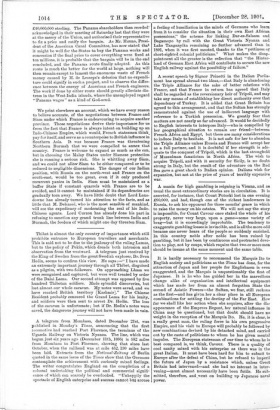It is hardly necessary to recommend the Marquis Ito to
English society and politicians as the Times has done, for the attraction of Japan and her people for Englishmen is even exaggerated, and the Marquis is unquestionably the first of Japanese. It is he who has guided her in the marvellous change alike of organisation and intellectual equipment which has made her from an almost forgotten State the second of Asiatic Powers—the Sultan, we fear, still reckons as the first—and has givan her a clear place in all European combinations for settling the destiny of the Far East. How far we shall like her action when she acquires, after the dis- appearance of the Empress Regent, her natural influence in China may be questioned, but thit doubt should have no weight in the reception of the Marquis Ito. He, it is clear, is a really great man, the ruling force in his own progressive Empire, and his visit to Europe will probably be followed by new combinations devised by his detached mind, and carried out by the caste of politicians to whom he has given mental impulse. The European statesman of our time to whom he is best compared is, we think, Cavour. There is a quality of cool sanity, mixed with his enterprise as there was in the great Italian. It must have been hard for him to submit to Europe after the defeat of China, but he refused to imperil the future of Japan by a resistance which, unless Great Britain had intervened—and she had no interest in inter- vening—must almost necessarily have been futile. He sub- mitted, therefore, and went on building up Japanese naval power.


































 Previous page
Previous page